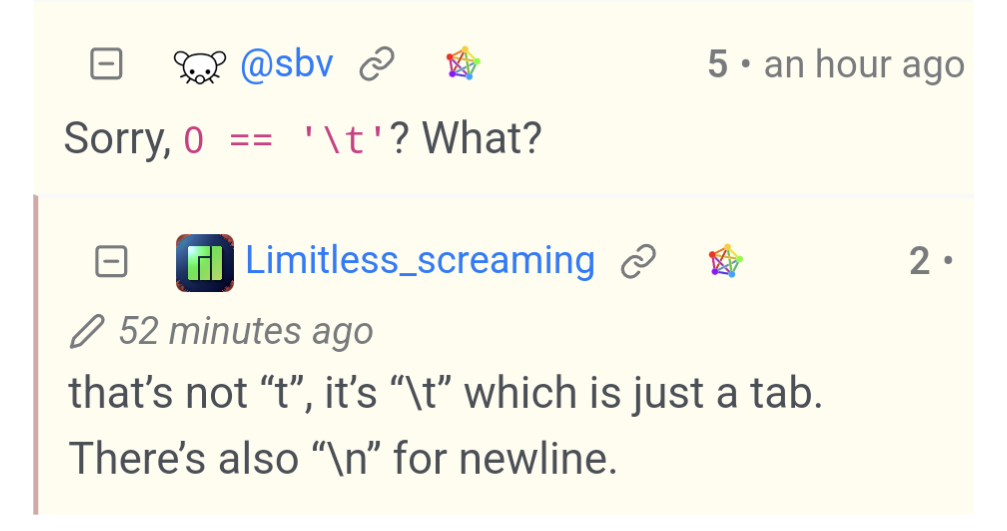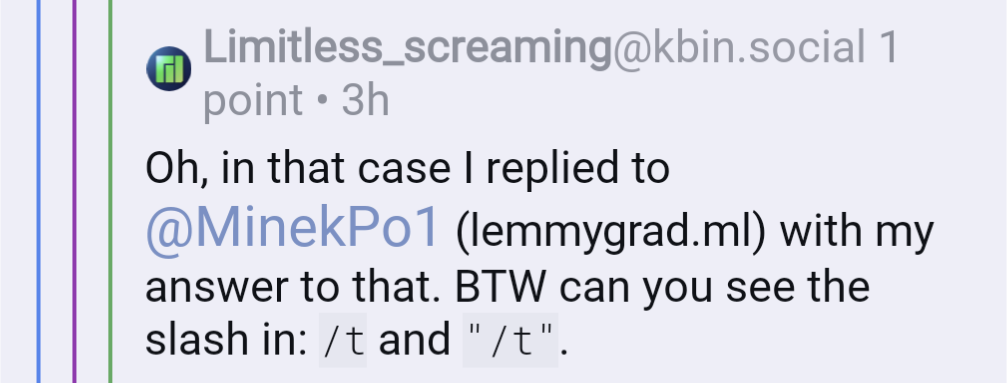Sorry,
0 == '\t'? What?You have to remember that the underlying principle of JavaScript seemed to be “never throw an error”, even if what it’s being told to do is weapons grade bollocks.
Yeah, it’s
true. I knew all the other ones, had to put that one in the dev tools console to believe it. I was just happy to know === continues to be sane in that comparison.that’s not “t”, it’s “\t” which is just a tab. There’s also “\n” for newline.
It’s a slash-t in the comment. Maybe kbin has different rendering rules for comments?

Oh, in that case I replied to @MinekPo1 with my answer to that. BTW can you see the slash in:
/tand"/t".I see a forward slash:

It still makes no sense though
If " " wasn’t equal to 0, it wouldn’t make sense, but since a string containing a space equals 0, you’d expect the same to apply to a string containing a tab or a newline. (or at least I’d expect that)
I admit I have never dabbled in javascript, despite being a proficient programmer. I now dread to ask… would any string that contains only whitespace == 0? " \t\n \t " for example?
Yes, it would. Just like a string of spaces
" " == 0, but it isn’t that bad;===is Javascript’s version of==in other languages, and, thus, you should be using it if you don’t want that wonkiness.==is just for convenience, like when you want to make sure that the user didn’t leave the form empty and the button shouldn’t be greyed out, and other UI stuff. Without these kinds of features JS wouldn’t be used in so many toolkits.Ok, I always mistakenly assumed === was the identity operator in JS, too. TIL, thanks! As much as we like to poke fun at JS, every time I’m taught the rationale behind some aspect of it, I find it redeeming and even a little endearing.
The explanation given to you makes it sound like
==was deliberately designed to be a more convenient version of===, but what actually happened was that==used to be the only equality operator in JavaScript, which meant that if you didn’t want it’s auto-coercing behavior then you needed to go out of your way to add additional type checks yourself. Because this was obviously a tremendously inconvenient state of affairs, the===operator was introduced later so that you could test for equality without having to worry about JavaScript doing something clever underneath the hood that you weren’t expecting.
This never gets old lmao
===is just==with extra stepsIt’s actually the other way around. == has to perform type coercions as part of its equality algorithm, whereas === does not, so == has more steps.
“The trinity makes as much sense as Javascript” is a vulgar condemnation of Christian dogma.
A few years back I came to the conclusion that the holy trinity in Christianity are three levels of abstraction: the son => God walks on earth and tangible, the father => God in heaven untangible but still reachable by speech, holy spirit => God in who knows where.
Then I thought that as a way of imparting the thought that any level of abstraction of the universe would also be inhabitated by God, those which we can sense, and those where our senses can’t reach. The idea that omniprescense is not only limited to our dimension.
I’m not sure if that is the original meaning but is a way of seeing it that I can relate to, since I’ve always been akeen to a more abstract idea of God, and not so much to a figure that praises itself of thought, which is a human attribute.





